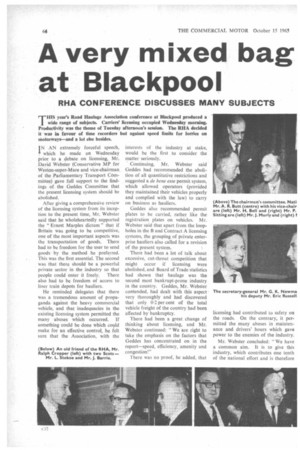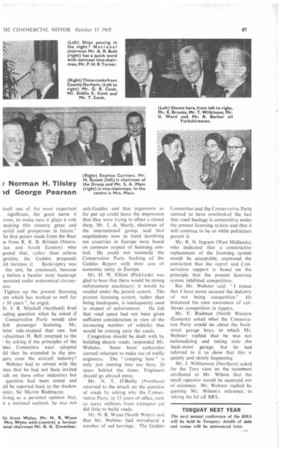A very mixed bag at Blackpool
Page 68

Page 69

If you've noticed an error in this article please click here to report it so we can fix it.
RHA CONFERENCE DISCUSSES MANY SUBJECTS
THIS year's Road Haulage Association conference at Blackpool produced a wide range of subjects. Carriers' licensing occupied Wednesday morning. Productivity was the theme of Tuesday afternoon's session. The RHA decided it was in favour of time recorders but against speed limits for lorries on motorways—and a lot else besides.
IN AN extremely forceful speech, A which he made on Wednesday prior to a debate on licensing, Mr. David Webster (Conservative MP for Weston-super-Mare and vice-chairman of the Parliamentary Transport Committee) gave full support to the findings of the Geddes Committee that the present licensing system should be abolished.
After giving a comprehensive review of the licensing system from its inception to the present time, Mr. Webster said that he wholeheartedly supported the "Ernest Marples dictum " that if Britain was going to be competitive, one of the most important aspects was the transportation of goods. There had to be freedom for the user to send goods by the method he preferred. This was the first essential. The second was that there should be a powerful private sector in the industry so that people could enter it freely. There also had to be freedom of access to liner train depots for hauliers.
He reminded delegates that there was a tremendous amount of propaganda against the heavy commercial vehicle, and that inadequacies in the existing licensing system permitted the many abuses which occurred. If something could be done which could make for an effective control, he felt sure that the Association, with the interests of the industry at stake, would be the first to consider the matter seriously.
Continuing, Mr. Webster said Geddes had recommended the abolition of all quantitative restrictions and suggested a de bear esse permit system, which allowed operators (provided they maintained their vehicles properly and complied with the law) to carry on business as hauliers.
Geddes also recommended permit plates to be carried, rather like the registration plates on vehicles. Mr. Webster said that apart from the loopholes in the B and Contract A licensing systems, the grouping of private enterprise hauliers also called for a revision of the present system.
There had been a lot of talk about excessive, cut-throat competition that might occur if licensing were abolished, and Boa rd of Trade statistics had shown that haulage was the second most bankrupt-prone industry in the country. Geddes, Mr. Webster contended, had dealt with this aspect • very thoroughly and had discovered that only 0.2 per cent of the total vehicle freight of the country had been affected by bankruptcy.
There had been a great change of thinking about licensing, and Mr. Webster continued: "We are right to take the emphasis on the factors that Geddes has concentrated on in the report—speed, efficiency, amenity and congestion!"
There was no proof, he added, that licensing had contributed to safety on the roads. On the contrary, it permitted the many abuses in maintenance and drivers' hours which gave power to the enemies of the industry.
Mr. Webster concluded: "We have a common aim. It is to give this industry, which contributes one tenth of the national effort and is therefore itself one of the most important significant, the good name it .trves; to make sure it plays a role making this country great and ierful and prosperous in future." he first points made from the floor le from R. R. B. Brittain (Metrotan and South Eastern) who gested that, rather than relieve gestion, the Geddes proposals ild increase it. Bankruptcy was the test, he continued, because g before a haulier went bankrupt )perated under economical circurnices.
Tighten up the present licensing em which has worked so well for r 30 years ", he urged.
Ir. J. B. Mitchel! (Scotland) fired ;tiding question when he asked if Conservative Party would also Iish passenger licensing. Mr. bster side-stepped that one, but :-chairman H. Bell returned to the by asking if the principles of the Ides Committee were adopted rid they be extended to the pasgers, even the aircraft industry? Webster had to retreat with the :rice that he had not been invited :alk on these other industries but question had been noted and ild be reported back to the shadow lister, Sir Martin Redmayne.
iiving as a personal opinion that, n a national outlook, he was not anti-Geddes and that arguments so far put up could leave the impression that they were trying to effect a closed shop, Mr. J. A. Murly, chairman of the international group, said that negotiations now in hand involving ten countries in Europe were based on common respect of licensing control. He could not reconcile the Conservative Party backing of the Geddes Report with their aim of economic unity in Europe.
Mr. H. W. Elliott (Pickfords) was glad to hear that there would be strong enforcement machinery; it would be needed under the permit system. The present licensing system, rather than being inadequate, is inadequately used in respect of enforcement. He felt that road space had not been given sufficient consideration in view of the increasing number of vehicles that would be coming onto the roads.
Congestion should be dealt with by building decent roads, responded Mr. Webster. Some local authorities seemed reluctant to make use of traffic engineers. The "creeping lane" is only just coming into use here. 10 years behind the times. Engineers should go abroad more.
Mr. N. T. O'Reilly (Northern) returned to the attack on the question of roads by asking why the Conservative Party, in 13 years of office, took so many millions from transport yet did little to build roads.
Mr: N. R. Wynn (South Wales) said that Mr. Webster had introduced a number of red herrings. The Geddes Committee and the Conservative Part) seemed to have overlooked the fact that road haulage is competitive under the present licensing system and that it will continue to be so while politicians permit it.
Mr. R. N. Ingram (West Midlands), who indicated that a constructive replacement of the licensing system would be acceptable, expressed the conviction that the report and Conservative support is based on the principle that the present licensing system inhibited competition.
But Mr. Webster said: " I repeat that I have never accused the industry of not being competitive." He instanced his own awareness of cutthroat competition in tippers.
Mr. F. Rudman (North Western (Eastern)) asked what the Conservative Party would do about the backstreet garage boys, to which Mr. Webster replied that he was not nationalizing and taking over the back-street garage, but he had referred to it to show that this is quietly and slowly happening.
Mr. J. Williamson (Northern) asked for the Tory view on the statement attributed to Mr. Wilson that the small operator would be squeezed out of existence: Mr. Webster replied by quoting Mr. Wilson's references to taking the lid off BRS.








































































































































